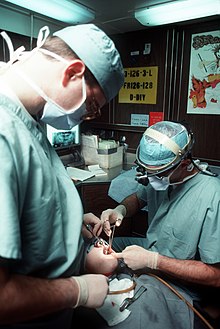**Foundations of Dentistry**:
– Dentistry originates from the French and Latin words for tooth.
– Odontology refers to the study of tooth structure, development, and abnormalities.
– The first dental school was established in Bainbridge, Ohio, in 1828.
– Evidence of dentistry dates back to 13,820-14,160 years ago with rudimentary tools used by Neanderthals.
– Dentistry has historical roots in various ancient civilizations like Egypt, Greece, and China.
**Dental Treatment and Oral Health**:
– Oral diseases are significant public health issues globally.
– Common dental treatments include restoration, extraction, scaling, and root canal therapy.
– Regular dental checkups are essential for prevention and early detection of oral diseases.
– Gum disease is linked to increased risks of diabetes and heart disease.
– Oral health’s impact on systemic health is known as oral-systemic health.
**Specializations in Dentistry**:
– Cosmetic dentistry focuses on improving the appearance of the mouth, teeth, and smile.
– Anesthesiology deals with the advanced use of general anesthesia, sedation, and pain management for dental procedures.
– Endodontics focuses on root canal therapy and diseases of the dental pulp and periapical tissues.
– Forensic odontology involves the gathering and use of dental evidence in law for identification purposes.
– Prosthodontics involves dentures, bridges, and restoration of implants.
**Modern Practices and Technology in Dentistry**:
– Evidence-based dentistry promotes scientific research in dental care.
– Dental exams can aid in diagnosing systemic diseases like celiac disease.
– Modern dentistry incorporates digital technology for diagnostics and treatment planning.
– Dental implants have revolutionized tooth replacement procedures.
– Advances in technology have improved dental education globally.
**Education, Licensing, and Ethical Considerations**:
– Different dental schools may lead to varied clinical decisions by dentists.
– Dentists in the UK are overseen by the General Dental Council.
– Dentistry is considered the first specialization in medicine.
– Dentists undertake further training to specialize in various fields.
– Accreditation of dental schools can enhance education quality.
Dentistry, also known as dental medicine and oral medicine, is the branch of medicine focused on the teeth, gums, and mouth. It consists of the study, diagnosis, prevention, management, and treatment of diseases, disorders, and conditions of the mouth, most commonly focused on dentition (the development and arrangement of teeth) as well as the oral mucosa. Dentistry may also encompass other aspects of the craniofacial complex including the temporomandibular joint. The practitioner is called a dentist.
 A dentist treats a patient with the help of a dental assistant. | |
| Occupation | |
|---|---|
| Names |
|
Occupation type | Profession |
Activity sectors | Health care, Anatomy, Physiology, Pathology, Medicine, Pharmacology, Surgery |
| Description | |
| Competencies |
|
Education required | Dental Degree |
Fields of employment |
|
Related jobs | |
| ICD-9-CM | 23-24 |
|---|---|
| MeSH | D003813 |

The history of dentistry is almost as ancient as the history of humanity and civilization, with the earliest evidence dating from 7000 BC to 5500 BC. Dentistry is thought to have been the first specialization in medicine which has gone on to develop its own accredited degree with its own specializations. Dentistry is often also understood to subsume the now largely defunct medical specialty of stomatology (the study of the mouth and its disorders and diseases) for which reason the two terms are used interchangeably in certain regions. However, some specialties such as oral and maxillofacial surgery (facial reconstruction) may require both medical and dental degrees to accomplish. In European history, dentistry is considered to have stemmed from the trade of barber surgeons.
Dental treatments are carried out by a dental team, which often consists of a dentist and dental auxiliaries (such as dental assistants, dental hygienists, dental technicians, and dental therapists). Most dentists either work in private practices (primary care), dental hospitals, or (secondary care) institutions (prisons, armed forces bases, etc.).
The modern movement of evidence-based dentistry calls for the use of high-quality scientific research and evidence to guide decision-making such as in manual tooth conservation, use of fluoride water treatment and fluoride toothpaste, dealing with oral diseases such as tooth decay and periodontitis, as well as systematic diseases such as osteoporosis, diabetes, celiac disease, cancer, and HIV/AIDS which could also affect the oral cavity. Other practices relevant to evidence-based dentistry include radiology of the mouth to inspect teeth deformity or oral malaises, haematology (study of blood) to avoid bleeding complications during dental surgery, cardiology (due to various severe complications arising from dental surgery with patients with heart disease), etc.
